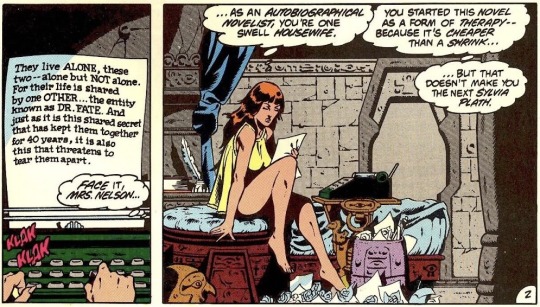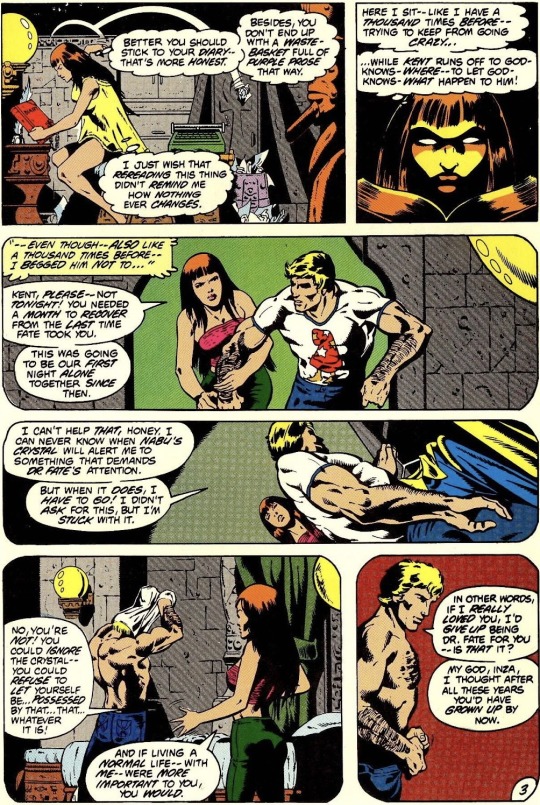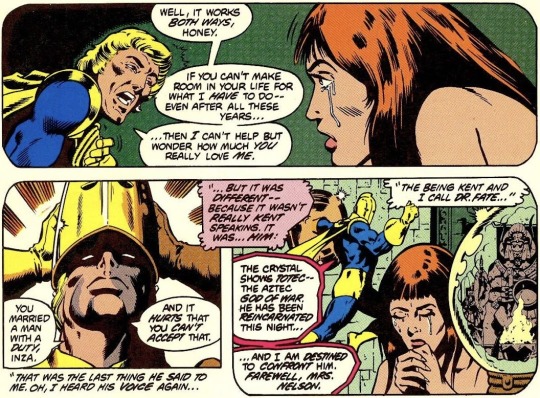#ok I’m understanding the mechanics of Dr. Fate better know
Text




back-up story to The Flash (1959) #306, as republished in Immortal Doctor Fate (1985) #2
#ok I’m understanding the mechanics of Dr. Fate better know#I like what they’re doing here with Inza#regarding the emphasis on Inza not being able to understand the Dr. Fate side of Kent’s life#I figure that making Dr. Fate a shared mantle at the end of Doctor Fate (1987) was intended to play off that specifically#I’m not as confident in this but I wonder if making Eric and Linda’s relationship overtly inappropriate#was intended as commentary on Kent and Inza’s#maybe commentary is not the right word#making the interest begin when Eric was still physically ten and adding the step-mother angle changes the situation#and makes it more indisputably bad#so less of commentary on Kent and Inza’s relationship and more of playing off of them by making the succeeding characters darker/worse#back to the panels- I think that portraying Inza here as like a prisoner with no life purpose outside of (worrying about) Dr. Fate#also serves to highlight how Kent himself is like a prisoner with no life purpose outside of Dr. Fate#Kent saying ‘I thought after all these years you’d have grown up by now.’#stands out considering that he was rapidly aged from 12 to adulthood#it’s weirdly infantilizing for him to say to his wife#it’s also wack cause as far as I know she did grow up normally#it comes across to me as un-self aware with to be fair if anyone has an excuse for that it’s Kent#anyway I feel like I can’t really blame either of them in this situation like they’re both in bad positions#dc#kent nelson#inza nelson#my posts#comic panels
7 notes
·
View notes
Text
I Stopped Saying Sorry for One Week—& Honestly, It Felt Great
In C'mon, It's Just 7 Days, members of the Food52 team share what it was like to take on a personal challenge for one week: skipping caffeine, going plastic-free, and more. (Spoiler alert: We all survived.)
For as long as I can remember, “I’m sorry,” has slipped from my lips as easily as my name. Examples of things I regularly apologize for include: sitting down, standing up, talking too much, not talking enough, trying too hard, not giving my all, failing to ask questions, asking too many questions, and, of course, apologizing for over-apologizing.
But, after a coworker pointed out that I said I was sorry after doing him a favor a couple of weeks ago, I began to reassess.
Because, the thing is, I’m not necessarily saying it because I actually have anything to be sorry about. It’s almost always a mindless reaction—a way to dissolve tension, or to appeal to somebody else’s feelings, or to protect myself from what my anxious brain fears are mistakes I’ve made. And who knows exactly how, over the last few decades, I developed this habit. It could’ve been as a coping mechanism for my over-thinking, a means of feeling like I’m in control, or the subtle conditioning of society (or a very effective VeggieTales episode). What I do know is that I needed a change.
So, when my co-workers challenged me to try something new for our C'mon, It's Just 7 Days series, it seemed fated that I should try giving up apologizing for one week. My rules would be simple: for seven days, I’d do my best not to utter the words “I’m sorry,” or similar iterations (apologies, forgive me, my bad, etc.), no matter the person or situation. Even if I really was sorry, by stripping the words from my vocabulary, I hoped to recondition myself to be more mindful of when I actually wanted to apologize.
Well, let’s just say I got a healthy dose of that mindfulness I was after—and then some. Here are my four main takeaways from the week:
1. Think before I speak.
On the first day of my challenge, while I was volunteering at a local school, a first-grade disaster struck. A little boy accidentally pinched his classmate’s finger with his toy police car, resulting in buckets of tears on both sides. As I walked the pinch-victim to the water fountain to catch her breath, I found myself fighting back an apology. The tears sliding down her little face broke my heart, and I struggled to find a way to make her forget the hurt.
When we harm someone or make a mistake, it’s logical to apologize. But what about the moments where we witness a wrong or a person opens up about their pain? Saying sorry often feels like an answer.
Slowing down and distinguishing how I truly felt presented a slew of learning moments throughout my week. Often, I turned to a quote from Dr. Brené Brown, a research professor and best-selling author of Rising Strong, who has spent the past decade studying vulnerability, courage, worthiness, and shame.
“One of the things we do sometimes in the face of very difficult conversations is we try to make things better,” she says. “If I share something with you that’s very difficult, I’d rather you say, ‘I don’t even know what to say right now. I’m just so glad you told me.’”
This experiment made me think about the emotion I was actually experiencing in any given moment where I wanted to reflexively apologize. Was it sympathy? Empathy? Guilt? There’s no clear cut answer for how I should respond in any of those instances, but I realized that just because I feel bad about something doesn’t mean I need to apologize for it. But it also doesn’t mean I can’t help. (Or, that I can’t apologize for it, if I’ve given it some thought and that’s what I truly want to express.) What’s most important is to be mindful.
And on that Saturday morning, giving that little girl the space to be sad in a dingy hallway, being there to wipe away her tears, was the right thing. No sorrys needed.
2. It’s not just me—others apologize all the time.
As the week progressed, I realized I wasn’t the only one who chronically apologized. Everywhere I turned, I overheard someone saying sorry—to grab a person’s attention, to introduce a new topic in a conversation, to reach around a coworker for a spoon. Rather than getting directly to the point, people buffered ideas and requests and even their presences with an, “I’m sorry…”.
Like me (prior to this week), they seemed to be apologizing for things that were clearly not their fault, or so small it hardly seemed worthy of a sorry. Rather than sincere communication, their apologies felt like mindless crutches to avoid conflict.
By not responding in-kind (I found myself instead saying, “No sorrys needed! You’re fine!”), I was pushing back against superfluous apologies. Don’t get me wrong, apologies are important, but really only when they’re necessary. It’s empowering to mean what you say, to connect with genuine conversation. And as my experiment progressed, it wasn’t enough for me to stop apologizing; I wanted others to fight against too many sorrys, too.
3. Take the opportunity to say thank you.
Confession: not apologizing didn’t take away my guilt. I still felt bad when I made a mistake (whether real or perceived), and struggled with what to do with the emotion. After discussing it with my boyfriend, he suggested that I look at those moments as opportunities to say, “thank you.”
“Sorry I’m late,” became, “Thank you for waiting for me.”
“I’m sorry I didn’t respond earlier,” turned into “Thank you for reminding me about this.”
“Sorry I’ve complained for an hour about my week of not apologizing,” was now, “Thank you for understanding me and helping think of alternative ways to express my emotions.”
It’s really that simple. (Also, let’s be real—it feels a lot better to thank someone than to constantly cry mea culpa.)
4. It’s ok to forgive myself.
The irony of not apologizing for a week was that I messed up. A lot. Without thinking, I’d start to apologize for all sorts of things—bumping into someone, slurping, forgetting to respond to a text, grabbing the last cookie. I’d cover my mouth almost as soon as the words came out, turning the moment into an awkward, “Sorry, not sorry!” situation. I got a lot of strange looks for seven whole days.
As the challenge went on, I had to remind myself that it was ok to slip up. For 26 years, I had over-apologized for everything under the sun, and it was understandable that I’d fall back into well-worn patterns. I needed time to unlearn, and patience when I stumbled.
Forgiving myself didn’t come easily. It still doesn’t.
Now, weeks later, I still get frustrated when I catch myself thoughtlessly apologizing. But I want to get better, and I feel like I’ve armed myself with useful strategies to make that happen. Being kind to myself—allowing for and accepting my mistakes—seems like the first step in overcoming this sorry problem.
Do you ever find yourself over-apologizing? Let me know in the comments!
Source: https://food52.com/blog/23636-how-to-stop-saying-sorry-over-apologizing-for-everything
0 notes
Text
I Stopped Saying Sorry for One Week—& Honestly, It Felt Great
In C'mon, It's Just 7 Days, members of the Food52 team share what it was like to take on a personal challenge for one week: skipping caffeine, going plastic-free, and more. (Spoiler alert: We all survived.)
For as long as I can remember, “I’m sorry,” has slipped from my lips as easily as my name. Examples of things I regularly apologize for include: sitting down, standing up, talking too much, not talking enough, trying too hard, not giving my all, failing to ask questions, asking too many questions, and, of course, apologizing for over-apologizing.
But, after a coworker pointed out that I said I was sorry after doing him a favor a couple of weeks ago, I began to reassess.
Because, the thing is, I’m not necessarily saying it because I actually have anything to be sorry about. It’s almost always a mindless reaction—a way to dissolve tension, or to appeal to somebody else’s feelings, or to protect myself from what my anxious brain fears are mistakes I’ve made. And who knows exactly how, over the last few decades, I developed this habit. It could’ve been as a coping mechanism for my over-thinking, a means of feeling like I’m in control, or the subtle conditioning of society (or a very effective VeggieTales episode). What I do know is that I needed a change.
So, when my co-workers challenged me to try something new for our C'mon, It's Just 7 Days series, it seemed fated that I should try giving up apologizing for one week. My rules would be simple: for seven days, I’d do my best not to utter the words “I’m sorry,” or similar iterations (apologies, forgive me, my bad, etc.), no matter the person or situation. Even if I really was sorry, by stripping the words from my vocabulary, I hoped to recondition myself to be more mindful of when I actually wanted to apologize.
Well, let’s just say I got a healthy dose of that mindfulness I was after—and then some. Here are my four main takeaways from the week:
1. Think before I speak.
On the first day of my challenge, while I was volunteering at a local school, a first-grade disaster struck. A little boy accidentally pinched his classmate’s finger with his toy police car, resulting in buckets of tears on both sides. As I walked the pinch-victim to the water fountain to catch her breath, I found myself fighting back an apology. The tears sliding down her little face broke my heart, and I struggled to find a way to make her forget the hurt.
When we harm someone or make a mistake, it’s logical to apologize. But what about the moments where we witness a wrong or a person opens up about their pain? Saying sorry often feels like an answer.
Slowing down and distinguishing how I truly felt presented a slew of learning moments throughout my week. Often, I turned to a quote from Dr. Brené Brown, a research professor and best-selling author of Rising Strong, who has spent the past decade studying vulnerability, courage, worthiness, and shame.
“One of the things we do sometimes in the face of very difficult conversations is we try to make things better,” she says. “If I share something with you that’s very difficult, I’d rather you say, ‘I don’t even know what to say right now. I’m just so glad you told me.’”
This experiment made me think about the emotion I was actually experiencing in any given moment where I wanted to reflexively apologize. Was it sympathy? Empathy? Guilt? There’s no clear cut answer for how I should respond in any of those instances, but I realized that just because I feel bad about something doesn’t mean I need to apologize for it. But it also doesn’t mean I can’t help. (Or, that I can’t apologize for it, if I’ve given it some thought and that’s what I truly want to express.) What’s most important is to be mindful.
And on that Saturday morning, giving that little girl the space to be sad in a dingy hallway, being there to wipe away her tears, was the right thing. No sorrys needed.
2. It’s not just me—others apologize all the time.
As the week progressed, I realized I wasn’t the only one who chronically apologized. Everywhere I turned, I overheard someone saying sorry—to grab a person’s attention, to introduce a new topic in a conversation, to reach around a coworker for a spoon. Rather than getting directly to the point, people buffered ideas and requests and even their presences with an, “I’m sorry…”.
Like me (prior to this week), they seemed to be apologizing for things that were clearly not their fault, or so small it hardly seemed worthy of a sorry. Rather than sincere communication, their apologies felt like mindless crutches to avoid conflict.
By not responding in-kind (I found myself instead saying, “No sorrys needed! You’re fine!”), I was pushing back against superfluous apologies. Don’t get me wrong, apologies are important, but really only when they’re necessary. It’s empowering to mean what you say, to connect with genuine conversation. And as my experiment progressed, it wasn’t enough for me to stop apologizing; I wanted others to fight against too many sorrys, too.
3. Take the opportunity to say thank you.
Confession: not apologizing didn’t take away my guilt. I still felt bad when I made a mistake (whether real or perceived), and struggled with what to do with the emotion. After discussing it with my boyfriend, he suggested that I look at those moments as opportunities to say, “thank you.”
“Sorry I’m late,” became, “Thank you for waiting for me.”
“I’m sorry I didn’t respond earlier,” turned into “Thank you for reminding me about this.”
“Sorry I’ve complained for an hour about my week of not apologizing,” was now, “Thank you for understanding me and helping think of alternative ways to express my emotions.”
It’s really that simple. (Also, let’s be real—it feels a lot better to thank someone than to constantly cry mea culpa.)
4. It’s ok to forgive myself.
The irony of not apologizing for a week was that I messed up. A lot. Without thinking, I’d start to apologize for all sorts of things—bumping into someone, slurping, forgetting to respond to a text, grabbing the last cookie. I’d cover my mouth almost as soon as the words came out, turning the moment into an awkward, “Sorry, not sorry!” situation. I got a lot of strange looks for seven whole days.
As the challenge went on, I had to remind myself that it was ok to slip up. For 26 years, I had over-apologized for everything under the sun, and it was understandable that I’d fall back into well-worn patterns. I needed time to unlearn, and patience when I stumbled.
Forgiving myself didn’t come easily. It still doesn’t.
Now, weeks later, I still get frustrated when I catch myself thoughtlessly apologizing. But I want to get better, and I feel like I’ve armed myself with useful strategies to make that happen. Being kind to myself—allowing for and accepting my mistakes—seems like the first step in overcoming this sorry problem.
Do you ever find yourself over-apologizing? Let me know in the comments!
Source: https://food52.com/blog/23636-how-to-stop-saying-sorry-over-apologizing-for-everything
0 notes